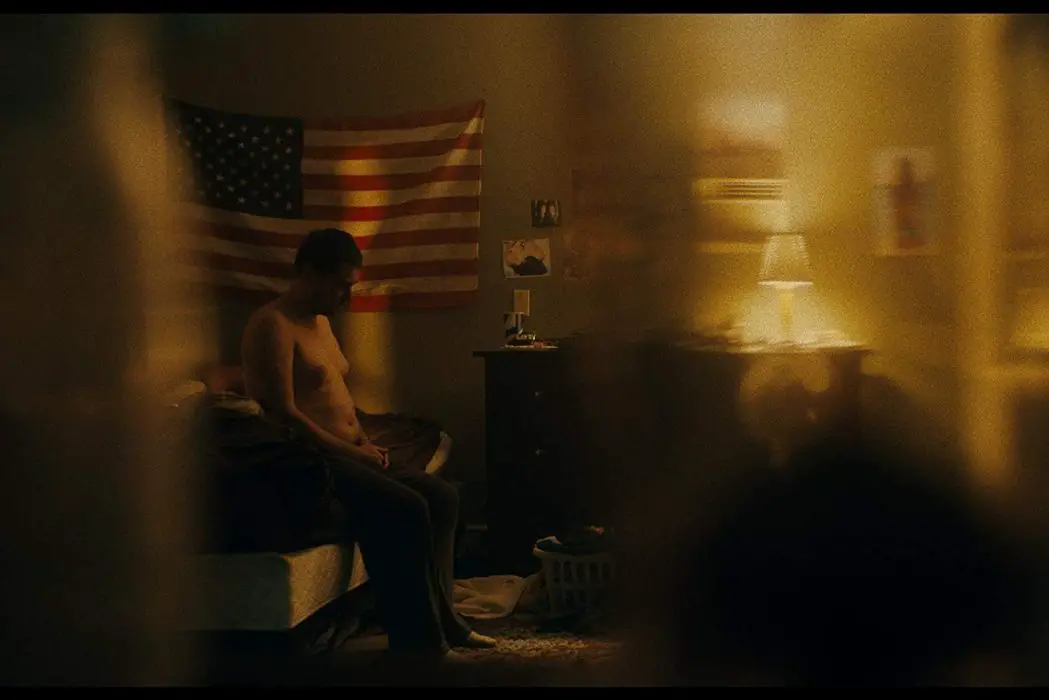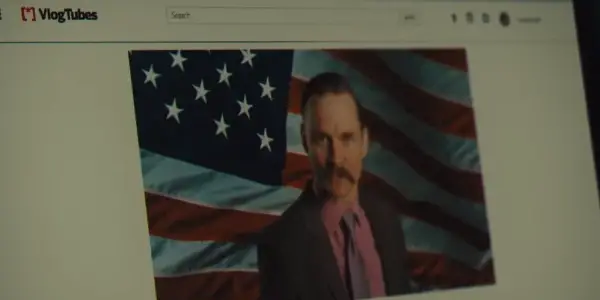CUCK: A Cautionary Tale For No One

A writer of fiction and criticism, and English student based…
Well, it’s a bold way to make your debut, that’s for certain.
As soon as the trailer for co-writer/director Rob Lambert‘s feature film Cuck was made public on YouTube earlier in September, it got a fair bit of attention. In great part, attention from right-wing circles online who mocked it for looking like biased and misinformed “leftist propaganda.” There was equal comparison drawn to the film Joker, as they’re both films about dangerous social outcasts being released on the same weekend. Needless to say, the responses almost exclusively took it as a joke.
But every film deserves a fair chance, even if marketing makes it look less than appealing. Besides, if art exists to evoke feelings, then negative knee-jerk reactions would count it as a success. Maybe Cuck could go beyond the surface too. With provocative subject matter such as this, there may be potential behind the confrontational title. It would be enough to arouse legitimate conversation about a real problem in the United States, and then become a greater success in that regard.
That’s not what happens here. What Lambert crafted instead is a tone-deaf and brain dead character study where any and all insight is shredded and tossed out to make way for Z-grade exploitation.
The Angry Young Man
Ronnie (Zachary Ray Sherman) is a socially inept man living with his religious mother (Sally Kirkland). In his free time not spent trying to get a job, he’s either watching pornography or perusing forums and videos that announce discriminatory rhetoric. Prepare to see a who’s who of far-right buzzwords being used like they’re going out of style, even once Ronnie starts posting his own vlogs, ranting about everything from immigration to women to an audience of thousands.

Let us ignore the fact that the quality of these videos, which show him rambling at his grainy laptop webcam for upwards of a few minutes, would realistically attract a few hundred views at best. It’s more curious how Ronnie is voicing displeasure over being told what to think and how to act by “social justice warriors” when we see him being the unquestionable agent of his own demise. He calls women derogatory names to their face when they ignore his advances, he lashes out at his ailing mother and steals her money often, and on one occasion, antagonizes a group of black men at his workplace. This leads to him being beaten, after which he turns on his Middle Eastern boss and gets fired.
The latter interaction exists to introduce him to his attractive older neighbor Candy (Monique Parent) and her husband Bill (Timothy V. Murphy). They make their money through Candy’s sex work, and hire Ronnie to play the cuckolded husband in videos where he must watch Candy mid-coitus with masculine men of color as he gets mocked and humiliated. It hints at a clever direction to go in where the title is turned on its head by revealing the racial connotations behind the term “cuck.” However, the film would rather use the situation to further Ronnie down his downward spiral of feeling inadequate.
He’s shown as if we didn’t watch him being a vocal xenophobe for the past hour, like this is another stepping stone to becoming a hatemonger. Even more, the bigotry we’ve seen him express and the pornography he consumes should have made him aware of this kink, and more resistant to take part. It’s a classic case of wanting to have the cake and eat it too, reminding us of Ronnie’s ugly worldview while trying to humanize him through his insecurities. That goal is bound to be in vain though, as the devil is in the details.
Confused Politics, But Somehow Not Political

In an interview with Vents Magazine, Rob Lambert stated that while he and his co-writer Joe Varkle wanted to examine the common angers and motives of such figures as Dylann Roof and Elliot Rodger, and gave his film the title of a far-right insult, he was not seeking out to lean anybody in any way, or even make something political. “I don’t like films that are trying to influence me,” he said. “As a filmmaker, I strive to make presentational films versus propaganda films, however this subject and film will undoubtedly move and upset a lot of people.”
Not to doubt that he’s not being earnest in his intentions, but it doesn’t hold up when far-right politics and bigotry are at the root of the people he named. The character of Ronnie isn’t just being “presented,” but shown to be a man consumed with a brand of hatred that shouldn’t be promoted. Most statements of the film also label the film as a cautionary tale, something to warn others of how dangerous nationalism can become when mixed with disillusionment.
But the burning question lies in just who is meant to be cautioned? What audience is trying to be reached? People on the left are going to hate Ronnie as a protagonist because he starts out being a bigot, and we see little of him falling into the alt-right rabbit hole as the synopsis implies. People on the right are going to hate him because he’s a strawman of their beliefs, committing that cardinal sin of racism in fiction being so overt as to not call out casual racists.
At the same time, all of his conflicts come in the form of other strawmen, such as when he goes on a coffee date, and the woman doesn’t hesitate to drop feminist theory terms when he says something sexist. Not to mention the stereotypes Ronnie and his uncle Larry (Hugo Armstrong) chat about on everything from Arabs to black people wind up being portrayed as true, and whether intended or not, justify his beliefs.
There’s also confusing additions like Bill sporting various neo-Nazi tattoos, but appearing to have no problem being the actual cuckold who films his wife having sex with other men unless it’s Ronnie trying to make his move. Do they mean to say that Ronnie’s the true “cuck” even in the eyes of someone with more radical views than him? Is it because Bill’s more masculine and that makes his position filming Candy seem more positive by comparison?

These questions arise in a constant wave as you see more and more of the ideologies clash through its two-hour runtime, and despite a desire from Lambert to “pull the curtain back on the root of this anger and confusion [as] a way to deal with the issues head on,” he’s as vague as can be in his approach. Nothing parallels real life as everything is shown to be melodramatic or hyper-gritty, and everyone behaves like an archetype of what they stand for instead of a nuanced figure in a massive system. And so the audience walks out of the theater learning nothing new, feeling a mixture of confusion and shame.
Cuck: Conclusion
There’s a lot of conversation to be had about what to do to help the growing number of dejected members of society who fall victim to embracing hate. It’s not hard to unlearn the behaviors when we attempt to look at and reach them like human beings, speaking in a way that sympathizes and understands their plight. Influencing anyone takes a lot of effort, and it’s the aimlessness these young men have that opens them to at least finding a way to change their hearts.
Cuck is not as interested in those conversations as it lets on. Even the title is dehumanizing as it refers to the main character as an object in these events, someone to stand as an avatar for what the filmmakers think of the subjects they’re claiming to “present,” and not preach about.
With that first impression alone, it’s a failure. Upon delving deeper and watching the film, it’s a dangerous and offensive failure. This will change no minds, but only justify and deepen the persistent bitterness among all parties represented. It would be a massive cinematic wedge driver between the people, if only it were relevant enough.
What are some films you’d recommend that tackle the idea of the anti-social young man? Does simply saying a film isn’t political prevent it from being read politically?
Does content like this matter to you?
Become a Member and support film journalism. Unlock access to all of Film Inquiry`s great articles. Join a community of like-minded readers who are passionate about cinema - get access to our private members Network, give back to independent filmmakers, and more.
A writer of fiction and criticism, and English student based in Baltimore. Berry’s aspirations of becoming an animator/filmmaker started young. It was a high school film studies course that shifted their interest to wanting to discuss them. They maintain a growing list of favorite films, ranging from Ingmar Bergman’s Persona to Stephen King’s Maximum Overdrive.













